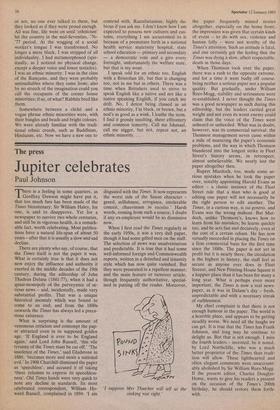The press
Jupiter celebrates
Paul Johnson
rr here is a feeling in some quarters, as Geoffrey Dawson might have put it, that too much fuss has been made of the Times bicentenary; Sir William Haley, for one, is said to disapprove. Yet for a newspaper to survive two whole centuries, and still be in vigorous health, is a remark- able fact, worth celebrating. Most publica- tions have a natural life-span of about 50 years - after that it is usually a slow and sad decline.
There are plenty who say, of course, that the Times itself is not the paper it was. What is certainly true is that it does not now enjoy the influence and authority it exerted in the middle decades of the 19th century, during the editorship of John Thadeus Delane (1841-77), when it had a quasi-monopoly og the purveyance of se- rious news - and, incidentally, made very substantial profits. That was a unique historical anomaly which was bound to come to an end; and from the 1880s onwards the Times has always led a preca- rious existence.
What is surprising is the amount of venomous criticism and contempt the pap- er attracted even in its supposed golden age. 'If England is ever to be England again,' said Lord John Russell, 'this vile tyranny of the Times must be cut off.' The insolence of the Times,' said Gladstone in 1886, 'becomes more and more a national evil.' In 1908 Churchill dismissed the paper as 'speechless', and accused it of taking 'three columns to express its speechless- ness'. Old Times hands were very quick to note any decline in standards. Its most celebrated correspondent, William Ho- ward Russell, complained in 1894: 'I am disgusted with the Times. It now represents the worst side of the Saxon character - greed, selfishness, arrogance, intolerable conceit, chauvinism in excelso.' Harsh words, coming from such a source; I doubt if any ex-employee would be so dismissive now.
When I first read the Times regularly in the early 1950s, it was a very dull paper, though it had some gifted men on the staff. The selection of news was unadventurous and predictable. It is true that it had some well-informed foreign and Commonwealth reports, written in a detached and leisurely style which has now quite vanished. But they were presented in a repellent manner; and the main feature or turnover article, though frequently authoritative, special- ised in putting off the reader. Moreover, 'I suppose Mrs Thatcher will tell us the sinking was right.' the paper frequently missed stories altogether, especially on the home front; the impression was given that certain kinds of event - to do with sex, violence and human folly - were not worthy of the Times's attention. Such an attitude is fatal, and one certainly got the feeling that the Times was dying a slow, albeit respectable, death in those days.
When Thomson took over the paper, there was a rush to the opposite extreme, and for a time it went badly off course, being neither a serious paper nor a popular 'quality. But gradually, under William Rees-Mogg, stability and seriousness were re-established. I never thought the Times was a good newspaper as such during this editorship, but the leaders carried great weight and not even its worst enemy could claim that the voice of the Times went unheard or unheeded. What was in doubt, however, was its commercial survival: the Thomson management never came within a mile of mastering the paper's economic problems, and the way in which Thomson blundered into the longest strike in Fleet Street's history seems, in retrospect, almost unbelievable. We nearly lost the paper altogether then.
Rupert Murdoch, too, made some se- rious ivistakes when he took the paper over, notably appointing Harold Evans as editor - a classic instance of the Fleet Street rule that a man who is good at editing one paper will not necessarily be the right person to edit another. The Times, in a curious way, is sui generis, and Evans was the wrong mahout. But Mur- doch, unlike Thomson's, knows how to learn from his mistakes; he learns quickly too, and he acts fast and decisively, even at the cost of a certain odium. He has now virtually succeeded in placing the Times on a firm commercial basis for the first time since the 1880s. The paper is not yet in profit but it is nearly there; the circulation is the highest in history, the staff feel as secure as anyone ever does in Fleet Streeet, and New Printing House Square is a happier place than it has been for many a long year. What is perhaps even more important, the Times is now a real news- paper, as it was in Delane's day - fresh, unpredictable and with a necessary streak of ruthlessness.
My chief complaint is that there is not enough humour in the paper. The world is a horrible place, and appears to be getting steadily worse. We need all the laughs we can get. It is true that the Times has Frank Johnson, and long may he continue to delight us. But that is not enough. I miss the fourth leaders - invented, be it noted, by Lord Northcliffe, who was a much better proprietor of the Times than tradi- tion will allow. These lighthearted and often elegant comments were unaccount- ably abolished by Sir William Rees-Mogg. If the present editor, Charles Douglas- Home, wants to give his readers a present on the occasion of the Times's 200th birthday, he should restore them forth- with.






































 Previous page
Previous page